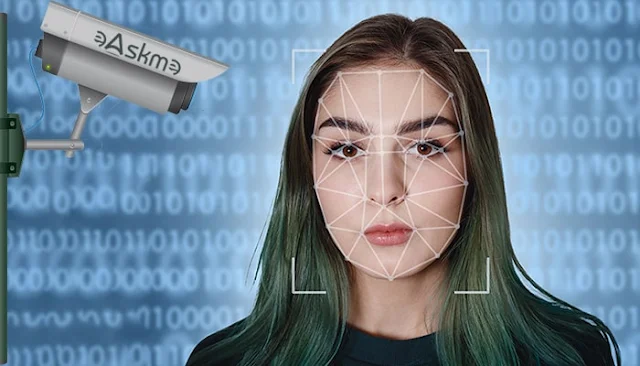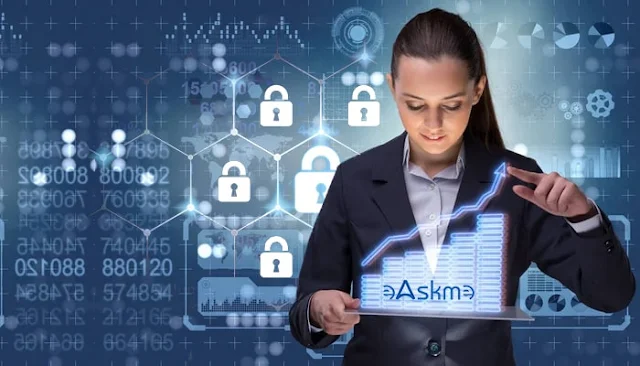With the rapid development of Artificial Intelligence(AI), integrating AI into security cameras and systems has revolutionized how people perceive and utilize security gadgets.
The capability of AI to process and analyze data at remarkable speeds has introduced a new era of more intelligent and efficient surveillance.
This article will explore some standard AI functions applied in security cameras and explain some privacy and ethical concerns about this technology.
Understanding Artificial Intelligence (AI) in Security Cameras:
 |
| What is AI Function in Security Cameras?: eAskme |
Artificial Intelligence (AI) refers to developing computer systems that can perform tasks that typically require human intelligence.
In other words, as a subset of computer science, AI empowers machines to simulate human-like intelligence.
AI systems use algorithms to process data, learn from it, and improve their performance over time.
Artificial intelligence encompasses a range of technologies, from machine learning to neural networks, and finds applications in various fields.
In surveillance, AI empowers security cameras beyond mere video recording, transforming them into intelligent observers capable of understanding their surroundings.
For instance, the most common AI-powered models are auto-tracking security cameras.
Common AI Functions in Security Cameras:
Artificial Intelligence (AI) has been widely used in security cameras, and AI functions make these devices smarter than ever before.
Some common AI functions in security cameras include the following.
Object Detection and Recognition:
AI algorithms demonstrate remarkable efficiency in recognizing and tracking objects and empower video surveillance systems to identify and monitor individuals, vehicles, and noteworthy items.
Through deep learning techniques, AI-powered surveillance systems can adeptly and swiftly recognize faces, license plates, pets, and other specific objects in real-time within their field of view, especially those 4K high-resolution models.
This AI function proves invaluable in identifying suspects, locating individuals, and reducing false alarms.
Facial Recognition for Access Control:
Face recognition works through image processing, pattern recognition, and machine learning techniques.
AI systems can identify distinctive features of a face based on the dataset, such as the distance between the eyes, the shape of the nose, and more.
AI algorithms can accumulate the recording footage of the camera and then analyze the data to differentiate between different faces by adjusting its internal parameters.
For example, AI algorithms can classify new, unseen faces by comparing their numerical representations to the ones learned in the dataset.
Security cameras with facial recognition can grant or deny access to individuals based on their detected identities. Users can tag the faces of visitors or family members.
If an unfamiliar face is seen, the camera can push real-time alerts to the app more accurately and timely.
Behavior Analysis and Anomaly Detection:
Detecting anomalies is another area where AI has significantly impacted video surveillance systems.
By identifying patterns or instances in data that deviate considerably from the norm or expected behavior, AI-powered models can help users proactively address potential issues, improve system reliability, and enhance overall decision-making processes.
For example, suppose an individual enters a restricted area or leaves an unattended bag in a public space.
In that case, the system can generate real-time alerts, enabling security personnel to take appropriate action.
Behavioral analysis, on the other hand, can provide valuable insights for optimizing security protocols and resource allocation.
Thanks to deep learning algorithms, some camera models can detect irregular behaviors within their field of view and help property owners establish daily routines for danger or threat prevention.
Automated Tracking and Monitoring:
Automated tracking and monitoring in security cameras involve using artificial intelligence and computer vision to detect, follow, and analyze moving objects or individuals within a camera's field of view.
The process begins with object detection; the camera's AI system analyzes the video feed to identify potential objects or individuals moving within the frame.
Then, the AI system creates a "tracking box" around the detected object and predicts the likely path the object will take over the successive few frames.
As the object moves within the camera's view, the AI system adjusts the tracking box's position to keep it centered on the object.
Most AI-powered PTZ cameras have this functionality, which can pan and tilt automatically to track the movements of humans, vehicles, or even animals.
Alerts and Real-Time Notification:
Alerts and real-time notifications in AI-powered security cameras involve using advanced image processing and AI algorithms to detect specific events or anomalies, triggering immediate alerts to users or security personnel.
AI-powered security cameras can continuously capture and analyze the video stream from its field of view.
This process involves breaking down the video into frames and analyzing each individually.
Then, the camera will use the algorithms mentioned above to track or detect irregular movements.
The AI system triggers an alert when detecting an anomaly or predefined event.
Once an alert is generated, the AI-powered camera sends a real-time notification to the designated recipients.
These recipients could include security personnel, property owners, or authorized users via various communication methods, such as mobile apps, emails, or text messages.
Emotion Analysis and Crowd Management:
In crowded environments, such as airports or stadiums, AI algorithms can analyze the behavior of individuals within a crowd.
Some advanced AI systems can even analyze facial expressions to gauge emotions within a crowd.
Advanced models can even accurately tally the number of individuals in a particular location.
Along with advanced algorithms for identifying suspicious behaviors, overcrowding, or potential conflicts, security cameras can enhance crowd management and prevent dangerous situations from escalating.
Privacy and Ethical Considerations of Using AI for Security Cameras:
Integrating AI in security cameras offers numerous benefits for surveillance and safety, but it also raises significant privacy and ethical considerations.
AI functions in security cameras can capture and analyze sensitive information, and this feature can potentially intrude on an individual's privacy by recording their actions, behaviors, and even personal appearances.
Facial recognition technology can also raise significant ethical questions.
It could lead to potential misuse, tracking individuals without their consent, and enabling profiling or discrimination.
The data collected and stored by AI-powered security cameras must be accurately secured to prevent unauthorized access or data breaches.
A breach could lead to the exposure of important information.
So, balancing between security needs and respecting individual privacy rights is a priority when using AI-powered security cameras.
Conclusion:
By leveraging the power of artificial intelligence, security cameras have made significant strides in delivering real-time alerts, automating person or object detection, and strengthening security measures.
Nevertheless, it is crucial to acknowledge the privacy and ethical considerations of using AI in security cameras to ensure responsible and transparent deployment of these devices.
As artificial intelligence progresses, we can anticipate even more remarkable advancements in security cameras, contributing to more competent and efficient surveillance.
Still have any question, do share via comments.
Share this post with your friends and family.
Don't forget to like us FB and join the eAskme newsletter to stay tuned with us.
Other handpicked guides for you;






















